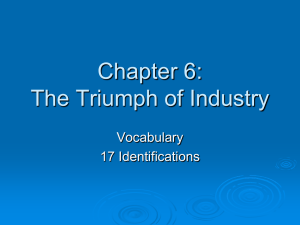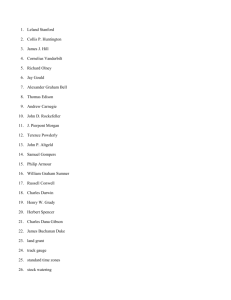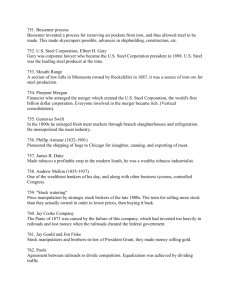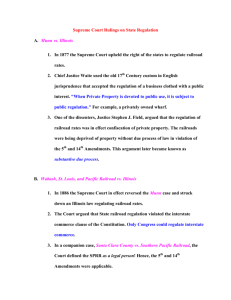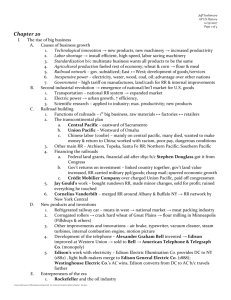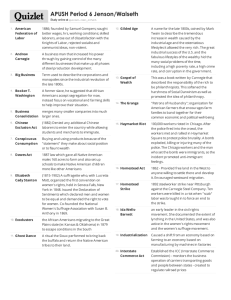Unit 8 Vocabulary - Perry Local Schools
advertisement
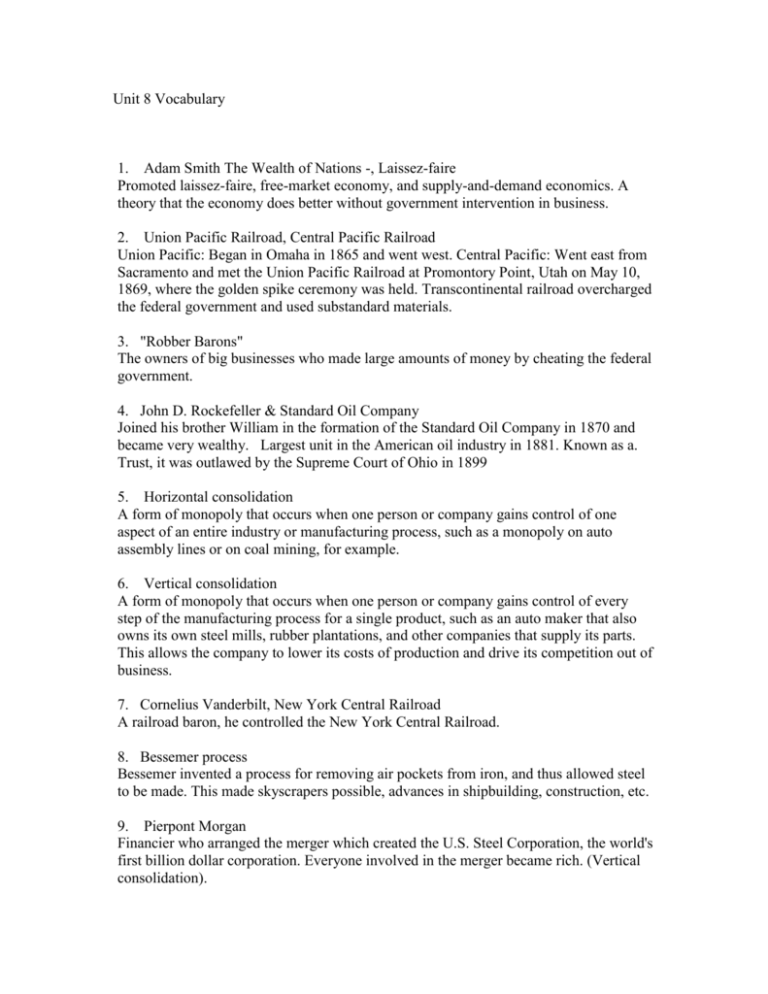
Unit 8 Vocabulary 1. Adam Smith The Wealth of Nations -, Laissez-faire Promoted laissez-faire, free-market economy, and supply-and-demand economics. A theory that the economy does better without government intervention in business. 2. Union Pacific Railroad, Central Pacific Railroad Union Pacific: Began in Omaha in 1865 and went west. Central Pacific: Went east from Sacramento and met the Union Pacific Railroad at Promontory Point, Utah on May 10, 1869, where the golden spike ceremony was held. Transcontinental railroad overcharged the federal government and used substandard materials. 3. "Robber Barons" The owners of big businesses who made large amounts of money by cheating the federal government. 4. John D. Rockefeller & Standard Oil Company Joined his brother William in the formation of the Standard Oil Company in 1870 and became very wealthy. Largest unit in the American oil industry in 1881. Known as a. Trust, it was outlawed by the Supreme Court of Ohio in 1899 5. Horizontal consolidation A form of monopoly that occurs when one person or company gains control of one aspect of an entire industry or manufacturing process, such as a monopoly on auto assembly lines or on coal mining, for example. 6. Vertical consolidation A form of monopoly that occurs when one person or company gains control of every step of the manufacturing process for a single product, such as an auto maker that also owns its own steel mills, rubber plantations, and other companies that supply its parts. This allows the company to lower its costs of production and drive its competition out of business. 7. Cornelius Vanderbilt, New York Central Railroad A railroad baron, he controlled the New York Central Railroad. 8. Bessemer process Bessemer invented a process for removing air pockets from iron, and thus allowed steel to be made. This made skyscrapers possible, advances in shipbuilding, construction, etc. 9. Pierpont Morgan Financier who arranged the merger which created the U.S. Steel Corporation, the world's first billion dollar corporation. Everyone involved in the merger became rich. (Vertical consolidation). 10. Rebates Developed in the 1880s, a practice by which railroads would give money back to its favored customers who shipped in large bulk quantities (Standard Oil), rather than charging them lower prices, so that it could appear to be charging a flat rate for everyone. 11. Trusts Firms or corporations that combine for the purpose of reducing competition and controlling prices (establishing a monopoly). There are anti-trust laws to prevent these monopolies. 12. Fourteenth Amendment's "Due Process Clause" No state shall deny a person life, liberty, or property without due process of law. (The accused must have a trial.) Used to justify Laissez-faire policy of the day. 13. Munn v. Illinois 1877 - The Supreme Court ruled that an Illinois law that put a ceiling on warehousing rates for grain was a constitutional exercise of the state's power to regulate business. It said that the Interstate Commerce Commission could regulate prices. 14. Wabash, St. Louis and Pacific Railroad Company v. Illinois 1886 - Stated that individual states could control trade in their states, but could not regulate railroads coming through them. Congress had exclusive jurisdiction over interstate commerce. 15. Interstate Commerce Act, Interstate Commerce Commission First Regulatory agency over economic activity. A five member board that monitors the business operation of carriers transporting goods and people between states. 16. Long haul, short haul Different railroad companies charged separate rates for hauling goods a long or short distance. The Interstate Commerce Act made it illegal to charge more per mile for a short haul than a long one. 17. Sherman Antitrust Act 1890 - A federal law that committed the American government to opposing monopolies, it prohibits contracts, combinations and conspiracies in restraint of trade. 18. E.C. Knight Company vs. US 1895 - The Supreme Court ruled that since the Knight Company's monopoly over the production of sugar had no direct effect on commerce, the company couldn't be controlled by the government. It also ruled that mining and manufacturing weren't affected by interstate commerce laws and were beyond the regulatory power of Congress. 19. Knights of Labor: An American labor union originally established as a secret fraternal order and noted as the first union of all workers. It was founded in 1869 in Philadelphia by Uriah Stephens and a number of fellow workers. Membership was open to all types of workers 20. American Federation of Labor (AFL) Began in 1886 with about 140,000 members; by 1917 it had 2.5 million members. It is a federation of different unions. Membership was open to only skilled craftsman. Joined with the Congress of Industrial Organizations in 1955 to make up the largest federation of unions in the United States. 21. IWW, Wobblies, "Big Bull" Haywood Denounced populists because they believed in free enterprise. Haywood was the leader of the Wobblies. The International Workers of the World (Wobblies) were a militant, radical union. They favored socialism and opposed free enterprise. They were disliked by big business and less radical unions. 22. Collective bargaining Discussions held between workers and their employers over wages, hours, and conditions. 23. Injunction A judicial order forcing a person or group to refrain from doing something. 24. Boycotts People refuse to buy a company's product until the company meets demands. 25. Closed shop A working establishment where only people belonging to the union are hired. It was done by the unions to protect their workers from cheap labor. 26. Black list A list of people who had done some misdeed and were disliked by business. They were refused jobs and harassed by unions and businesses. 27. Yellow Dog contracts A written contract between employers and employees in which the employees sign an agreement that they will not join a union while working for the company. 28. Great Railroad Strike July, 1877 - A large number of railroad workers went on strike because of wage cuts. After a month of strikes, President Hayes sent troops to stop the rioting. The worst railroad violence was in Pittsburgh, with over 40 people killed by militia men. 29. Haymarket Square Riot 100,000 workers rioted in Chicago. After the police fired into the crowd, the workers met and rallied in Haymarket Square to protest police brutality. A bomb exploded, killing or injuring many of the police. The Chicago workers and the man who set the bomb were immigrants, so the incident promoted anti-immigrant feelings. Governor of Illinois during the Haymarket riots, he pardoned three convicted bombers in 1893, believing them victims of the "malicious ferocity" of the courts. 30. Homestead Strike The workers at a steel plant in Pennsylvania went on strike, forcing the owner to close down. Armed guards were hired to protect the building. The strikers attacked for five months, then gave in to peace demands. 31. Pinkertons Members of the Chicago police force headed by Alan Pinkerton, they were often used as strike breakers. 32. Pullman Strike, 1894 Started by enraged workers who were part of George Pullman's "model town", it began when Pullman fired three workers on a committee. Pullman refused to negotiate and troops were brought in to ensure that trains would continue to run. When orders for Pullman cars slacked off, Pullman cut wages, but did not cut rents or store prices. 33. Eugene V. Debs Leader of the American Railway Union, he voted to aid workers in the Pullman strike. In the court case In Re Debs, A federal court found him guilty of restraint of trade, stopping US mail, and disobeying a government injunction to stop the strike. He later ran for president as a candidate of the Social Democratic Party. 34. "Honest Graft" George Washington Plunkitt Justified bribery or cheating. He was head of Tammany Hall and believed in "Honest Graft". 35. Political Machine, Boss Tweed & Tammany Hall Political Machines were local and State political party organizations that provided social services and jobs (patronage) in exchange for votes. Boss Tweed ran the nation’s larges Political Machine out of New York City’s Democratic headquarters Tammany Hall. He controlled New York and believed in "Honest Graft". 36. Thomas Nast Newspaper cartoonist who produced satirical cartoons, he invented "Uncle Sam" and came up with the elephant and the donkey for the political parties. He essentially brought down Boss Tweed. 37. Tenements Urban apartment buildings that served as housing for poor factory workers. Often poorly constructed and overcrowded. 38. Chinese Exclusion Law 1882 - Denied citizenship to Chinese in the U.S. and forbid further immigration of Chinese. Supported by American workers who worried about losing their jobs to Chinese immigrants who would work for less pay. 39. Ashcan School Also known as The Eight, a group of American Naturalist painters formed in 1907, most of whom had formerly been newspaper illustrators, they beleived in portraying scenes from everyday life in starkly realistic detail. Their 1908 display was the first art show in the U.S. 40. Herbert Spencer Social Darwinism Applied Darwin's theory of natural selection and "survival of the fittest" to human society -- the poor are poor because they are not as fit to survive. Used as an argument against social reforms to help the poor. 41. Nativism Relating to nationalism and immigrant trends. Nativist were anti-immigrant groups who advocated the discrimination and limiting of immigrants. 42. Andrew Carnegie (1835-1919), The Gospel of Wealth Carnegie was an American millionaire and philanthropist who donated large sums of money for public works. His book argued that the wealthy have an obligation to give something back to society. 43. Horatio Alger: Author of nickel and dime books geared toward young men promoting the ideas of Social Darwinism and the “self made man.” Critics argued his books only propagated the “myth” of the self made man. 44. "Gilded Age" A name for the late 1800s, coined by Mark Twain to describe the tremendous increase in wealth caused by the industrial age and the ostentatious lifestyles it allowed the very rich. The great industrial success of the U.S. and the fabulous lifestyles of the wealthy hid the many social problems of the time, including a high poverty rate, a high crime rate, and corruption in the government.
